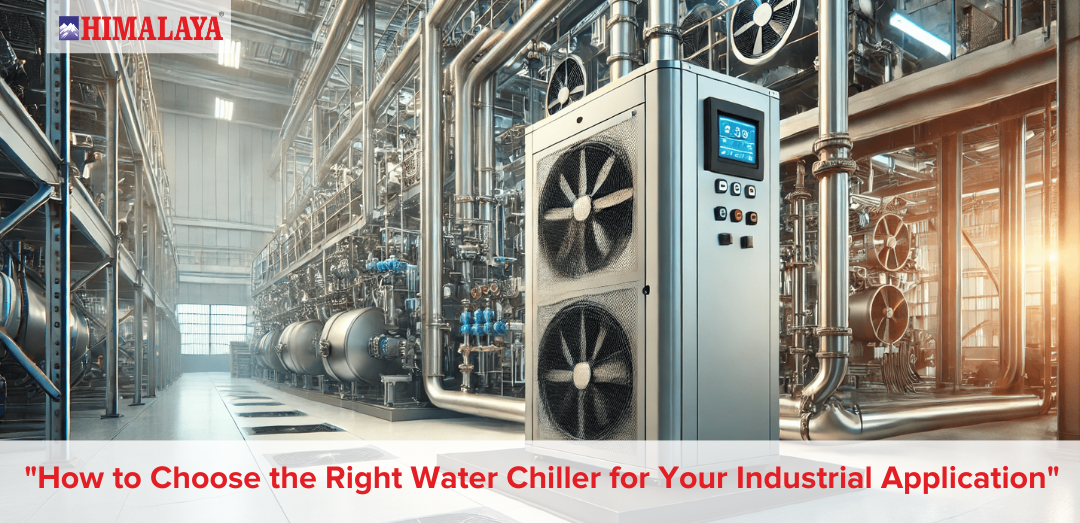
Right Water Chiller for Your Industrial Application
Selecting the right water chiller is crucial for maintaining efficient industrial cooling processes. The right choice ensures optimal system performance, minimizes energy costs, and extends equipment lifespan. Whether you’re in manufacturing, food processing, or medical applications, understanding key selection factors will help you invest wisely.
Key Factors to Consider
1. Understand Your Cooling Requirements
Before selecting a chiller, assess your specific cooling needs:
-
Cooling Load: Calculate the heat generated by your system in kilowatts (kW) or tons of refrigeration (TR). A properly sized chiller prevents inefficiency and excessive energy consumption.
-
Required Outlet Temperature: Define the precise temperature required for your application (e.g., 5°C for food storage or 20°C for plastic molding).
-
Flow Rate: Measure the water circulation needed (liters per minute or gallons per minute) to ensure optimal cooling.
2. Types of Water Chillers
Choose a chiller based on your environment, cooling needs, and available resources:
-
Air-Cooled Chillers:
-
Best for: Outdoor use, facilities with limited water supply.
-
Pros: Lower maintenance, no water consumption.
-
Cons: Higher energy use, less efficient in hot climates.
-
-
Water-Cooled Chillers:
-
Best for: Large facilities with access to a steady water source.
-
Pros: Higher efficiency, stable performance in various climates.
-
Cons: Requires a cooling tower, higher upfront cost.
-
3. Chiller Capacity and Sizing
Selecting the correct chiller size is critical for efficiency:
-
Rule of Thumb: 1 ton of refrigeration = 12,000 BTU/hr.
-
Example: A system generating 60,000 BTU/hr needs a 5-ton chiller.
-
Oversizing vs. Undersizing:
-
Oversized chillers waste energy and lead to higher operational costs.
-
Undersized chillers strain the system, reducing performance and lifespan.
-
4. Energy Efficiency Considerations
Energy-efficient chillers reduce operational costs over time. Look for:
-
Coefficient of Performance (COP): Higher COP indicates better efficiency.
-
Energy Efficiency Ratio (EER): Higher EER ratings mean lower power consumption.
-
Variable Speed Drives (VSDs): Adjust compressor speed based on demand to save energy.
5. Environmental and Installation Factors
Your operating environment influences chiller performance and durability:
-
Ambient Temperature: Choose a chiller that operates efficiently in your climate.
-
Indoor vs. Outdoor Installation:
-
Outdoor chillers need weather protection and corrosion resistance.
-
Indoor chillers require proper ventilation and noise management.
-
-
Refrigerant Type: Opt for eco-friendly refrigerants (e.g., R-134a, R-410A) to meet environmental regulations.
6. Maintenance and Serviceability
A well-maintained chiller ensures long-term reliability. Consider:
-
Accessibility: Critical components (compressors, coils, pumps) should be easy to access.
-
Maintenance Schedule: Select a system with clear service guidelines and minimal downtime.
-
Service Support: Ensure spare parts availability and local service provider access.
7. Advanced Features to Consider
Modern chillers come with features that enhance performance and convenience:
-
Remote Monitoring: Enables real-time tracking and fault alerts for proactive maintenance.
-
Redundancy Systems: Backup circuits prevent downtime in case of failure.
-
Smart Controls: Automate temperature adjustments and energy optimization.
8. Budget and Total Cost of Ownership (TCO)
A cost-effective chiller balances initial investment and long-term expenses:
-
Capital Cost vs. Operating Cost: Cheaper models may have higher energy and maintenance costs.
-
Lifespan Consideration: High-quality chillers last 15–20 years with proper upkeep.
-
Warranty Coverage: A strong warranty protects against unexpected failures.
9. Application-Specific Considerations
Different industries have unique cooling demands:
-
Medical & Pharmaceutical: Requires precise temperature control and reliability.
-
Food & Beverage: Must meet strict health and safety regulations.
-
Plastics & Manufacturing: Needs rapid cooling cycles and high energy efficiency.
Conclusion
Selecting the right water chiller requires a thorough evaluation of cooling needs, efficiency, installation factors, and long-term costs. By carefully considering these aspects, you can invest in a reliable chiller that enhances productivity, minimizes energy consumption, and ensures uninterrupted operations for years to come.
Contact Us
For expert guidance on selecting the right water chiller for your industrial application, reach out to Himalaya Refrigeration Industries today!
Phone: +91 99795 5511
Email: sales@himalayaref.com
Our team is ready to assist you in finding the perfect cooling solution for your business!

